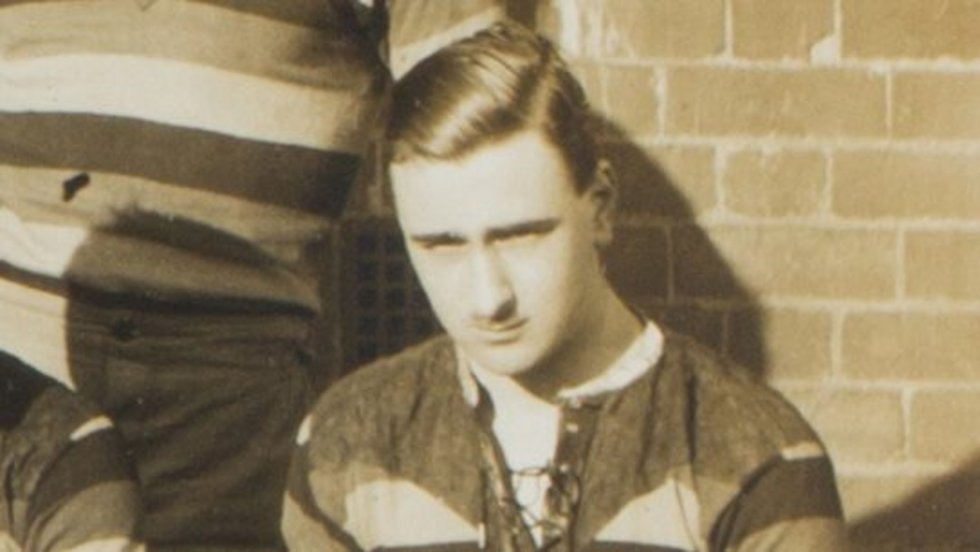- Played54
Bio
Years: 1921-29
At first glance having a Hall of Fame nomination for 54 first team appearances would not seem appropriate for a former Saints player, even if his strike rate of more than one try every other game is mightily impressive.
But if you are stood in the Terrace this season take a look at your match ticket or Season Card, or indeed the stadium maps located around the stadium and online, and you will see the name of today’s longlisted individual each and every home game.
Every club needs people behind the scenes to drive it on, taking it to greater heights with each passing year. Jerry Gordon falls very much into this category, and while it was Gordon Sturtridge who is more widely remembered for his presidency in the post-war years the Saints’ successes during this period would not have been possible without Gordon’s hard work, which – it would be fair to say – is largely unheralded when we look back from the 21st century.
In 1947/48, the Saints Supporters Club produced a pamphlet to commemorate what had been the club’s most successful season in its history to date. In it they wrote:
‘No history of the Saints would be complete without a tribute to EJ Gordon – ‘Jerry’ to all rugger enthusiasts. He has given nearly 19 years of loyal service to the club. His enthusiasm, hard and unremitting work have ever been devoted to one end – the upholding of the traditions of the Saints as one of the greatest teams in Great Britain playing the greatest game in the world.’
High praise indeed, and certainly deserving of a man who had entrenched his place as the club’s pre-eminent administrator. As club secretary he was the person who kept the wheels oiled and in motion, even getting a pet bull mastiff, called Mike, as a pet to help guard the money when he was taking it to the bank!
Gordon, already assistant club secretary in 1929, was elevated to the main job in an eventful annual general meeting at The Peacock Hotel following the ousting of incumbent Les Barnes in a second round of voting.
But it proved to be an outstanding choice, according to Brian Barron in ‘Oh When The Saints…’, the first edition of the club’s history book.
‘Gordon proved an inspired and inspiring choice. Not one person had an unkind word about him. For years he ran the Franklin’s Gardens hotel before handing over to [Eric] Coley, while he went farming at Rothersthorpe.
‘Former Chronicle and Echo chief photographer, Alan Burman, an apprentice electrician just after the War, was one of a number of youngsters who used to do maintenance work at the hotel.
‘“The vivid thing I remember is how immaculately dressed he always was, his clothes were very stylish and fashionable. But there was not a trace of arrogance. He never talked down to any of the kids.”’
Prior to becoming a hotelier Gordon had been an accountant for AC Palmer and Co, work he combined with his burgeoning playing career that was brought to a premature end by knee cartilage issues. His move into administration was immediate, and long-lasting, with his 36-year tenure as secretary and then president taking in the Wall Street Crash, Great Depression, World War II, rationing, and the first half of the swinging sixties, not to mention the Saints’ rise to being the leading club in the country.
Throughout that time his dedication to the Saints remained undimmed and crossed many areas, from writing to local clubs asking for recommendations of players to be considered and heading up the selection committee for matches, to catering for matches (the annual Easter tour was always preceded by a trip to the Rothersthorpe farm for a large hamper of food) and negotiating the costs to be paid to irate hotel owners after one mishap or another on an away trip.
Gordon was very close to Sturtridge, with whom he worked for 14 years between 1950 and 64. Gordon’s daughter, Jennifer, remembers not just the relationship the pair had, but the closeness her father had with all of the players in that period.
“Players would be regulars at the farm, both before and after he died,” she remembers. “My father was well known around town and All Saints Church was full for his memorial service. I’m certainly proud to be his daughter and to have his name be remembered at Franklin’s Gardens as part of the stadium.”
The building of the covered terrace on the popular side of the ground had taken many years of trying, but was finally opened in 1954/55, the season which coincided with Gordon’s 25th as secretary, and it was named after him immediately.
There is a saying that behind every good man is an even better woman, and Gordon’s wife, Hilda, certainly falls into that category, catering for dinners in the Salon nightclub next to the ground – with numbers sometimes exceeding 1,000 – and maintaining the running of the family dairy farm while her husband was occupied with running the rugby club.
The family also bred Arabian horses, initially in stables next to the old Members’ Stand, and Jennifer continues this to the present day.
Like Sturtridge, Gordon sadly died prematurely aged 65, just two years after taking over from the Australian as president, suffering a heart attack while waiting for an unrelated appointment at Northampton General Hospital. However for as long as there is rugby to be played and enjoyed at Franklin’s Gardens his name will endure as part of the fabric of the club and its home.





